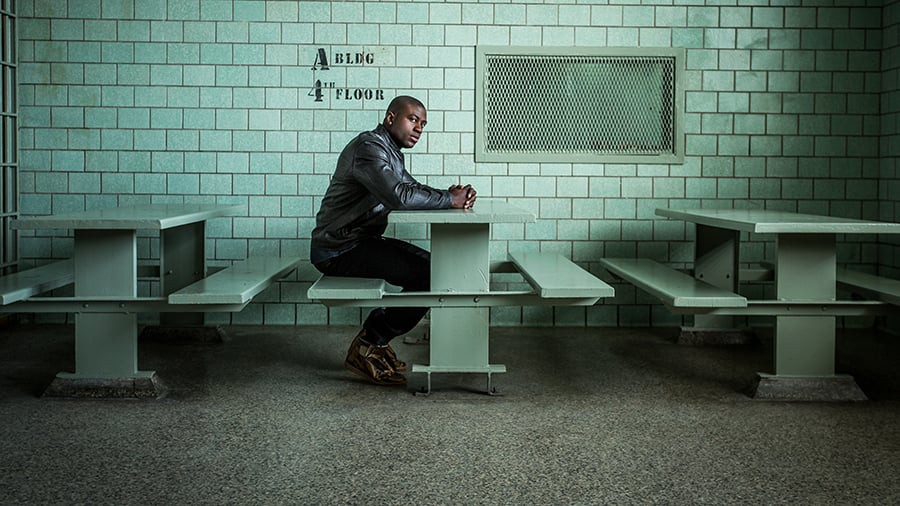Written by Ali Wakad and Yuval Adler
Directed by Yuval Adler
Israel, 2013
The final shot of the new Israeli film Bethlehem, one of last year’s nominees for the Best Foreign-Language Film Oscar, depicts two characters lying or sitting on the ground in a deserted field, a car behind them; in the distance, there’s a nondescript house hovering like a tiny specter. One of the (perhaps) unconscious messages of this closer is that the story told within Bethlehem is but one strand in the infinite web that is the fractious battle over statehood in the Middle East between Israel and Palestine. Early on, the writers and director take a near-novelistic approach to this tale, introducing more and more factions with a say in the control and power surrounding Bethlehem itself; by the end, the focus becomes laser-like on two leading characters, almost becoming less striking in the telling.
The city of Bethlehem is a hotbed of activity, where the Palestine Authority, which ostensibly controls all goings-on, is challenged by smaller groups as well as Hamas; amidst all of this, Israeli police use informants from Palestine to clue them in on future terrorist attacks. One Israeli officer, Raza (Tsahi Halevi), has a deep (or so he thinks) connection with his teenage informant Sanfur (Shadi Mar’i), whose older brother is one of the most feared terrorists in the region. He pushes Sanfur to help catch his brother in the act of taking money from Hamas–an act that the rest of his family and fellow freedom fighters don’t know about–but the simple decision to convince Sanfur to spend some time in a neighboring city while the checkpoints to Bethlehem are closed ends up causing a domino effect of personal disaster.
In the first third of Bethlehem, Raza and Sanfur don’t feel so much like dual protagonist as two pieces in an ever-growing puzzle. Through Raza, we see how intensely focused the Israeli police are in catching Palestinian terrorists; through Sanfur, we meet the rest of his expansive family, as well as other groups who wish to claim power in Bethlehem. Though the movie opens with Sanfur, and some friends, playing in an empty field (possibly the same one depicted in the closing scene) with artillery and bulletproof vests, it’s not precisely his story. Once the second half begins–after an intense and chaotic action sequence that’s staged appropriately by director and co-writer Yuval Adler–the focus lies squarely on these two men. In the first 50 minutes or so, however, it often feels as if Bethlehem might have contributed from either being longer (it’s only 102 minutes long), or from being presented in a different form, such as a miniseries.
Outside of the centerpiece action sequence, Adler doesn’t create a series of outstanding and unique images; instead, he mostly adds to the basic familiarity outsiders may have with the Middle East in his various depictions. The places these men occupy are nondescript, pale, beige, and functional instead of striking; the various dramas in which they take part are variations on familiar tropes, made intriguing because it’s one thing to watch a story of an informant and his handler in a Western setting, but seeing it in a part of the world that’s more deliberately fraught with tension is something else. Both Halevi and Mar’i are, apparently, first-time actors; they don’t show any signs of undue awkwardness or jitters, but they each contribute to the straightforward realism of Bethlehem. Raza, at one point, says he feels like he’s adopted a near-surrogacy with Sanfur, and the two actors create an unforced if jittery chemistry with each other.
 Bethlehem ends suddenly, if predictably. The third act is something of a march of inevitability, as one of the characters walks into a trap, one that seems so evident considering how much the people in this film are constantly trying to figure out and subvert all the angles. But for Bethlehem to pull some kind of surprise would be a false move; the script, to this point, has offered up a few surprises regarding Sanfur and his family, but none that are so shocking or game-changing that would inspire the audience to prepare for a third-act twist. At all times, this is a grimly straightforward thriller, one piece of a larger, unending saga that may never be resolved because each party within that saga is out for themselves more than for the whole of their people.
Bethlehem ends suddenly, if predictably. The third act is something of a march of inevitability, as one of the characters walks into a trap, one that seems so evident considering how much the people in this film are constantly trying to figure out and subvert all the angles. But for Bethlehem to pull some kind of surprise would be a false move; the script, to this point, has offered up a few surprises regarding Sanfur and his family, but none that are so shocking or game-changing that would inspire the audience to prepare for a third-act twist. At all times, this is a grimly straightforward thriller, one piece of a larger, unending saga that may never be resolved because each party within that saga is out for themselves more than for the whole of their people.
— Josh Spiegel






